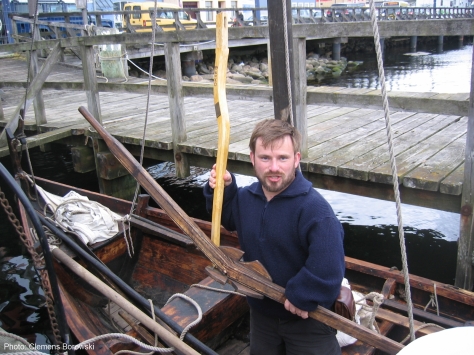On a trip in mid September we made encounter with one of the world’s oldest ships still actice: the topsail-schooner AMPHITRITE, built 1887 in Gosport and now operated by Clipper-DJS. And we encountered another sprit-rigger!
Category Archives: Johanna
RumRegatta 2013
This time we had splendid sailing weather: At 11:00 a signal flare indicated the start of the regatta and we sailed with a gentle south-westerly breeze to the Okseøer (“ox islands”), which marked the first leg of the regatta for the smaller vessels, including small fishing boats like ours, but also Viking ship reconstructions. These islands were first mentioned in the “Jordebok” – an early 13th-century Danish census. Incidentally, that is not the first time that Skíðblaðnir came across place-names mentioned in the Jordebok. In 2010 we followed the inner route along the Swedish coast described in an itinerary, which was also included in this census.
Once again the sail area proved to be insufficient to keep pace with the rest. Especially the Arendal sjekts were extraordinarily fast…they must have crossed the finishing line when we circumnavigated the Okseøer. But once we rounded them, we caught up to the field on a close-reach. Few metres before the finishing line, the wind suddenly stopped, and we were compelled to ship the oars. At 16:20 we crossed the finishing line as the 61st vessel of 99 registered ships. This was a truly fantastic day, and our sluggishness was rewarded by spending more hours amidst a fleet of historical ships.
LüttfischerRegatta 2013
On the day before the main race – the RumRegatta – we participated for the first time in a regatta for small fishing boats in Flensburg’s harbour: the LüttfischerRegatta.
Shortly after the starting signal, our right-of-way was ignored by a sjekte, which ran over one of our oars with a great cracking sound, instantly followed by my cursing. We needed the oars as auxiliary propulsion whenever we tacked (yes…I know…the boat ain’t well trimmed). With our good oar cracked, we had to rely on the old spare oars in the course of the event. We tried to catch up to the main field and did quite well under the circumstances. Later, the wind freshened to force 6 bft, maybe even 7 bft, and now it became clear that the spare oars were indeed not fit for service, as they both cracked during heavy rowing. To make matters worse, a very strong gust of wind pushed us onto a lee shore, and with only one oar (of four) left intact, which we needed badly for tacking, it became almost impossible to manoeuvre. So we took in the sails and waited for a tow. Together with another boat, we were towed back to the harbour, where we could at least view the spectacle from land, where small bottles had to be fished out from the water, which could be later traded with bottles filled with rum – the local brand. Regrettably, we had to skip the latter part, but we still won a prize: The charismatic regatta-organiser Gerd Büker couldn’t decide whether the daredevil feat (of pushing crew & equipment to such limits that lead to the loss of almost all oars) commended for a particularly good or a particularly bad skipper, but I received the “tough luck tiller” with pride…at least some form of recognition!
Indian Summer sailing
A trip in October with Ingo and Johanna











































